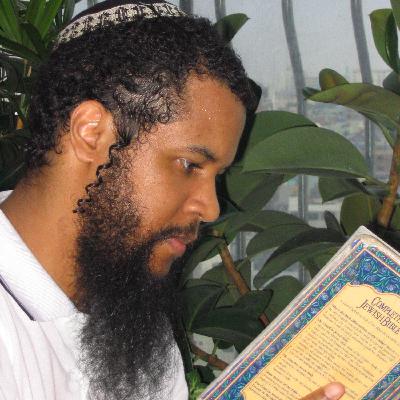37 Shlach L’kha (Part E) - Send on your behalf - Numbers 13:1-15:41
Update: 2015-05-11
Description
Conclusions If you are still not sure you understand the true intent behind Torah observance (which includes the command to wear fringes), I suggest reading my introductory teachings in this series. They are available at this web site, or you may write to me personally. As you seek to become more obedient to HaShem's Torah, by adding the mitzvah of the tzitzit, here is the traditional blessing by which Jews adorn themselves with the tallit: “Baruch atah YHVH, Eloheynu, Melech ha-‘Olam, asher kid-shanu b'mitzvotav, v'tzivanu l'hit-ateyf ba-tzitzit" (Blessed are you, O’ LORD, our God, King of the Universe, for you have sanctified us through thy commandments, and have commanded us to sew [wear] the fringes) It is also customary to recite Psalms 36:5-9. The reason for this choice of passages is that verse seven contains the Hebrew word "kanaf", usually translated "wing", or "extremity". A tallit contains four "wings" or "extremities", upon which the tzitzit are attached. To strengthen the connection between this use of the word kanaf, the prophet Malachi 4:2 predicted that when the Sun of Righteousness (another name for the expected Messiah) would arise, he would have "healing in his wings"! When the woman with the issue of blood reached out to touch Yeshua (Matt. 9:20-21), she was placing her trust in the miraculous healing contained within the extremity of his garment! She reached for the tassels of the long-awaited Savior! I encourage you to continue to study the Torah to discover the rich traditions that HaShem has lovingly placed there. To be sure, HaShem had us in mind when he created them. The portion ends with the promising phrase, “I am ADONAI your God, who brought you out of the land of Egypt in order to be your God. I am ADONAI your God.” We’ve seen this phrase/title before. The Torah seems to want us not to forget it! Why was this title important? HaShem has revealed an aspect of his character that would later play a very important role in the identity of the Jewish People as a Nation. This title would also serve as a reminder to the surrounding nations that "with a great out-stretched arm, ADONAI Almighty delivered his beloved people!" (see Moshe’s argument to HaShem in 14:13-16) To be sure, the reference of HaShem as the "God who delivered [them] from the bondage of Egypt" would become a "household" name of sorts. Looking back in the book of Sh’mot to the "Ten Commandments" (Sh'mot 20:1, 2) you can also find this phrase used to identify HaShem. Thumb through the rest of your TaNaKH (Old Testament) and you will find that this phrase is also used numerous times. As believers in Messiah Yeshua, we know that this is one of the primary character traits of HaShem, which unifies the Messiah and the Godhead as an "echad", that is as "one". The name of the Messiah comes from the Hebrew name "Y'hoshua", which itself stems from the Hebrew name "Hoshea". Both of these names are composites of the two Hebrew words for "God" and "will save", respectively. When we combine this knowledge with the fact that it is "YHVH" who offers us salvation from sin THROUGH Yeshua the Messiah, then we can begin to understand the significance of the type and shadow that the Torah teaches using the Exodus from Egypt and how it personally impacts our lives as new creations. The closing blessing is as follows: “Baruch atah YHVH, Eloheynu, Melech ha-‘Olam, asher natan lanu Toraht-emet, v’chay-yeh o’lam nata-b’tochenu. Baruch atah YHVH, noteyn ha-Torah. Ameyn.” (Blessed are you O’ LORD, our God, King of the Universe, you have given us your Torah of truth, and have planted everlasting life within our midst. Blessed are you, LORD, giver of the Torah. Ameyn.) “Shabbat Shalom!”
Comments
In Channel





